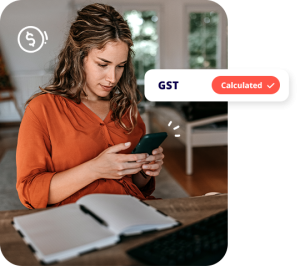SMALL BUSINESS RESOURCES
GST for freelancers
3 min read
You are out there now, freelancing like you always dreamed of and bosses are a quaint memory in your new normal.
Freelancing may be awesome, but how are you handling your new tax requirements, including GST? If you want to learn more about what GST is, or find helpful information about GST for freelancers specifically, just keep reading!
Do freelancers need to include GST?
GST or the goods and services tax generally applies to most businesses in Australia, with certain rules for certain industries and circumstances.
There are generally two reasons you register for GST as a freelancer: you earn over the gross threshold or you are in the taxi industry.
Up until you earn $75,000 a year you will not need to register for GST. Creep over that threshold, however, and you will most certainly need to register for GST – the penalties are rather severe if you do not.
If you operate as an Uber driver or similar, however, you need to register regardless as a part of the governments new rules dictating the taxi and ride share industry.
If you need to start charging GST, feel free to use our GST calculator tool to check how much GST you should be charging for your service(s).
1) Do freelancers need an ABN?
Absolutely you do! Before any GST considerations and before you are able to even register for GST you will need an ABN.
If you haven’t yet, do so through the ATO business portal.
2) Freelancers can register for GST voluntarily
Why would you want to register for GST as a freelancer voluntarily? A few sneaky benefits might tempt you such as claiming GST credits on purchases.
What does that mean? If you bought a camera for freelance photography work, you can claim the GST you paid as a tax credit. This can really work in your favour if you are purchasing a lot of work-related equipment.
3) Accidentally exceeded the GST threshold?
It happens. You were more competent and popular than you anticipated, and you earned more than $75,000 without registering for GST.
If you go over, you have 21 days to notify the ATO. So, always keep an up to date record of your income – your accounting software will make this a pedestrian triviality, so rely on it.
If you do not notify the ATO, they will charge you anyway, adding a fine and applying interest on your unpaid GST for good measure. To avoid this, just notify them and save yourself the extra stress.
4) Registering for GST
Now will you go for cash or accrual? This is a choice you need to decide upon when registering for GST and almost always it will be cash for freelancers and sole traders.
Choosing cash accounting means you record your income and expenses on the day income is received or goods are purchased.
Accruals means you record income on the day you issue an invoice, not when you receive funds – which is almost always unnecessary and needlessly complicated for freelancers.
Our tip? Go cash.
5) GST and invoices
You now need to charge your customers GST. When you are registered for GST your invoices should clearly read ‘tax invoice’.
Simply make this change and ensure your services or goods all have a GST component included in the cost breakdown.
If you are not registered, then no tax applies and you need them to read ‘invoice’.

Download our free GST guide
There’s a lot to get your head around when you’re starting a new business, and GST is just one bit most fledgling business owners will need to get to grips with. If you’re looking for help, download our free guide to better understand GST.

Track and manage GST with Reckon One
Cancel anytime.


















